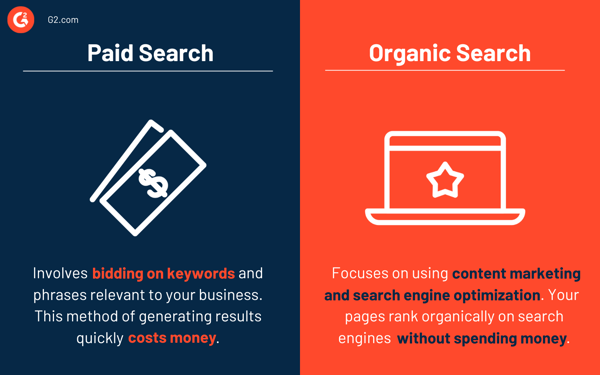December 3, 2025
 by Sagar Joshi / December 3, 2025
by Sagar Joshi / December 3, 2025

Paid search helps ads land directly on the search engine results page (SERP).
Search engines enable marketers to show ads to their target audience and drive traffic to their websites. As a result, you can prioritize visibility, traffic, and acquisitions.
Advertising costs usually vary and depend on your budget and the maximum bid amount you set. Modern marketers leverage paid search intelligence software to get the most value from advertising dollars.
Let’s explore how paid search can be an essential channel to drive leads and how to set it up for success.
The main difference between paid search and SEO is cost and speed. Paid search drives traffic by paying for ads that appear immediately in search results. SEO drives organic traffic by optimizing content and websites to rank naturally, which takes longer but delivers sustained results without paying per click.
Ads are shown based on bids, ad extensions, keywords, and the quality of ads and landing pages. The highest bidder gets the highest rankings for the phrases or keywords they’re bidding on. Ad extensions, such as links to a contact us page or a phone number, impact and potentially improve ad rankings.
Here’s how it works.
Suppose you’re running an ad to bring traffic to a landing page on Google. Google will assess your ad and the landing page to determine their relevance. Then, it assigns a quality score to the ad campaign, which has sway over how the ad ranks.
Search engines also consider various other factors, such as location, time, or competition, to rank paid search ads effectively.
Most businesses use pay-per-click (PPC) campaigns, a common form of paid search. These campaigns make an immediate impact by bringing in clicks to the pages they promote. This helps track returns and justify investments in running these campaigns.
Paid search ad campaigns help businesses attract their audience. When starting a business, you get initial leads from referrals. You assess these leads or customers and build a buyer persona to understand their pain better. When you’re through with this research, the next step leads you toward finding ways to attract more potential buyers.
Here, you look for ways customers can discover you on search engines, social media, and other spaces. With search engines like Google getting 95.4 billion searches monthly, trying out search engine marketing makes sense.
Here, you will need help deciding whether to use paid search ads or organic search engine optimization (SEO). Both have enormous potential to attract relevant buyers to a website.
Paid search ads involve bidding on keywords and phrases relevant to your business. This method of generating results quickly costs money.
On the other hand, organic search marketing focuses on using content marketing and search engine optimization. Your pages rank organically on search engines without any investment in ads.

Both of these strategies are equally important for a business. If you’re in the business-to-business (B2B) space, organic search marketing makes more sense since the audience spends a lot of time on your content before they get in touch. Consistent SEO and content efforts also have an added compounding effect on visibility.
However, it’s not like one is better than the other. They’re equally essential in growing your business.
Organic search marketing can take time to show impact and bring in leads. Whereas when you’re building a foundation, paid search advertising keeps up the lead inflow. It supports businesses in the early stages to bring in people who can be potential customers.
Paid search ads show impact faster than organic search marketing, delivering a faster return on investment (ROI). This ROI essentially helps justify the ad budgets to stakeholders later.
Paid ads offer a variety of benefits for marketers who use them to drive their target audience toward their brand.
Depending on the search engine, you’ll need an account to start the process. For Google, you can create a Google Ads account and connect it to your website. When you’re done, start configuring your paid search campaigns by following these steps:
Did you know? For an Exact Match, Google will show ads to people who look for plurals, synonyms, or other keyword variations. When you choose a Broad Match, the ads get in front of people who include words from your key phrases in their search queries. On the other hand, selecting a Phrase Match displays ads to people who use your key phrases in the exact order, but other words come before and after the key phrase.
G2 helps businesses find the best paid search intelligence software to analyze competitor ads, uncover keyword opportunities, and optimize search advertising performance at scale.
To qualify for inclusion in the paid search intelligence software list, a product must:
*Below are the leading paid search intelligence software from the G2's Winter 2026 Grid® Report. Some reviews have been edited for clarity.
Semrush amps up search engine marketing with features to analyze competitors' search advertising, including the keywords they target and their ad copy. It provides data on search volumes and trends, helping businesses identify effective keywords for their campaigns.
“I like Semrush because of its comprehensive and detailed SEO tool. The domain overview, Keyword gap, keyword magic tool, and backlink analytics are some of the best features. I also like that they offer a 7-day free trial to test their SEO. This allows students to use it for assignments and research without burning holes in their pockets.
Furthermore, the SEMRUSH Academy is a perfect learning platform for digital marketers and SEO specialists to know more about marketing strategies and how to improve their business.”
- Semrush review, Opeyemi O.
“The only downside of the tool is its hefty pricing, which might be an issue for small businesses.”
- Semrush review, Ankit V.
Similarweb provides insights into competitors' digital marketing strategies, including paid search campaigns. It shows the keywords competitors are bidding on and where their traffic comes from.
“What I use the most is the data from competitors, which we can't have in platforms like Google Ads, Meta, etc. It's beneficial to compare two or more websites.
The support is helpful, and I realize that the analysis possibilities are more numerous than I thought.”
- Similarweb review, Aurélie V.
“While Similarweb provides extensive analytics and insights, one area for improvement could be the pricing structure. The service can be on the higher end of the budget for small to medium-sized businesses or startups. Additionally, while the data is generally very comprehensive, there are occasional gaps in smaller market segments or niche industries. Streamlining the cost-effectiveness and expanding the depth of data in less prominent sectors could enhance the overall utility of the platform.”
- Similarweb review, Mehmet A.
SE Ranking focuses on providing detailed SEO and paid search insights. It allows users to optimize their campaigns by discovering gaps and opportunities in their search engine advertising strategy.
“SE Ranking is a friendly tool with a great UI. It has a full suite of tools, including keyword research, keyword rankings, reports, and site audits. I love the Site Audit tool, as it provides a thorough review of the site. I also love the report builder, as it is easy to use and full of great features, including a scheduler and a drag-and-drop builder.”
- SE Ranking review, Brandon G.
“My biggest gripe is a feature I've requested repeatedly: transferring the keyword tags from keyword research to project keyword rankings. Repeating the task is exhausting.”
- SE Ranking review, Sally R.
SpyFu provides detailed insights into the keywords competitors target on Google Ads and their most successful ad copy. It helps businesses understand competitors' strategies to create more effective search advertising campaigns.
“It’s a helpful tool for competitor analysis and keyword research. Using this, I can monitor competitors' activity, such as their backlinks and top-ranking content.”
- SpyFu review, Suman R.
“The interface is a bit confusing. Some features, such as 'Top Organic Competitors,' are not always accurate.”
- SpyFu review, Anahit A.
MobileAction enables marketing teams to understand search demand and competitor behavior through detailed keyword, ad, and market intelligence, helping them make smarter decisions and improve paid search performance.
“MobileAction provides valuable insights with seamless integration, easy setup, and features that support my work with a daily frequency of use. The platform is straightforward, but what truly elevates the experience is the customer support. Our CSM has been consistently responsive, helpful, and proactive in guiding us to optimize campaigns effectively.”
- MobileAction review, Karin A.
“The platform’s A/B testing and competitive insights are excellent, though the interface can feel a bit limited when drilling down into specific segments or custom reports.”
- MobileAction review, Jimmy.
Got more questions? We have the answers.
A common example of paid search is a Google ad that appears at the top of the search results when someone searches for a keyword like “CRM software” or “accounting tools for small businesses,” labeled as “Sponsored.”
A $10 daily budget can be enough to test Google Ads for low-competition keywords or local campaigns, but results may be limited in highly competitive industries where cost per click is higher.
Paid search can start driving traffic as soon as campaigns are approved and launched, though it may take days or weeks of optimization to see consistent lead or conversion results.
Businesses with clear customer intent, defined offerings, and conversion-focused landing pages, such as SaaS companies, service providers, and e-commerce brands, tend to benefit most from paid search.
Yes, paid search and SEO often work best together. Paid search delivers immediate visibility, while SEO builds long-term organic traffic and reduces reliance on ad spend over time.
Choose a paid search intelligence tool that aligns perfectly with your marketing strategy and overall business. Compare and contrast the options above, and consider actual users’ experiences to inform your decision.
Check out the top free paid search intelligence tools to try and explore the most suitable option.
This article was originally published in 2024. It has been updated with new information.
Sagar Joshi is a former content marketing specialist at G2 in India. He is an engineer with a keen interest in data analytics and cybersecurity. He writes about topics related to them. You can find him reading books, learning a new language, or playing pool in his free time.
Ahrefs starts at $108 a month, which adds up to about $1,200 a year for a plan designed for...
 by Sudipto Paul
by Sudipto Paul
As someone who’s been in the SEO game for a while, I have used Semrush for keyword research...
 by Sagar Joshi
by Sagar Joshi
As a content marketer, I’ve spent countless hours with SEO software to drive meaningful...
 by Washija Kazim
by Washija Kazim
Ahrefs starts at $108 a month, which adds up to about $1,200 a year for a plan designed for...
 by Sudipto Paul
by Sudipto Paul
As someone who’s been in the SEO game for a while, I have used Semrush for keyword research...
 by Sagar Joshi
by Sagar Joshi


